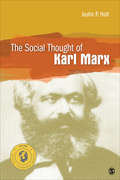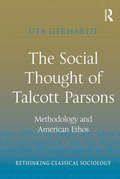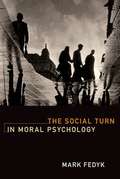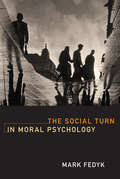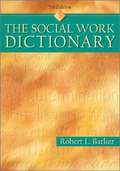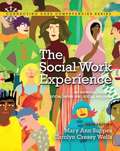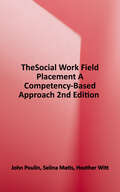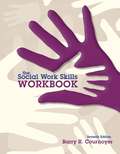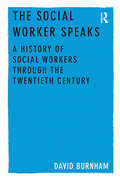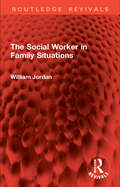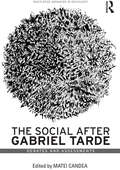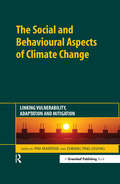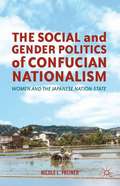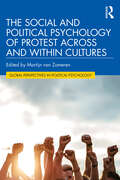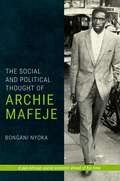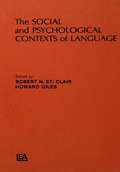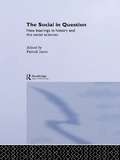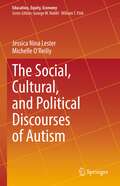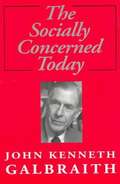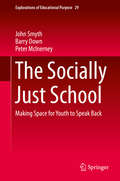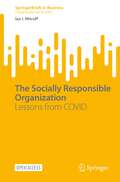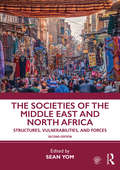- Table View
- List View
The Social Thought of Karl Marx (Social Thinkers Series)
by Justin P. HoltPart of the SAGE Social Thinkers series, this brief and clearly-written book provides a concise introduction to the work, life, and influences of Karl Marx, one of the most revered, reviled, and misunderstood figures in modern history. The book serves as an excellent introduction to the full range of Marx’s major themes—alienation, economics, social class, capitalism, communism, materialism, environmental sustainability—and considers the extent to which they are relevant today. It is ideal for use as a self-contained volume or in conjunction with other sociological theory textbooks.
The Social Thought of Talcott Parsons: Methodology and American Ethos (Rethinking Classical Sociology)
by Uta GerhardtThe Social Thought of Talcott Parsons offers an insightful new reading of the work of Talcott Parsons, keeping in view at once the important influences of Max Weber on his sociology and the central place occupied by methodology - which enables us to better understand the relationship between American and European social theory. Revealing American democracy and its nemesis, National Socialism in Germany as the basis of his theory of society, this book explores the debates in which Parsons was engaged throughout his life, with the Frankfurt School, C. Wright Mills and the young radicals among the "disobedient" student generation, as well as economism and utilitarianism in social theory; the opponents that Parsons confronted in the interests of humanism. In addition to revisiting Parsons' extensive oeuvre, Uta Gerhardt takes up themes in current research and theory - including social inequality, civic culture, and globalization - offering a fascinating demonstration of what the conceptual approaches of Parsons can accomplish today. Revealing methodology and the American ethos to be the cornerstones of Parsons' social thought, this book will appeal not only to those with interests in classical sociology - and who wish to fully understand what this 'classic' has to offer - but also to those who wish to make sociology answer to the problems of the society of the present.
The Social Turn in Moral Psychology
by Mark FedykIn this book, Mark Fedyk offers a novel analysis of the relationship between moral psychology and allied fields in the social sciences. Fedyk shows how the social sciences can be integrated with moral philosophy, argues for the benefits of such an integration, and offers a new ethical theory that can be used to bridge research between the two. Fedyk argues that moral psychology should take a social turn, investigating the psychological processes that motivate patterns of social behavior defined as ethical using normative information extracted from the social sciences. He points out methodological problems in conventional moral psychology, particularly the increasing methodological and conceptual inconsilience with both philosophical ethics and evolutionary biology. Fedyk's "causal theory of ethics" is designed to provide moral psychology with an ethical theory that can be used without creating tension between its scientific practice and the conceptual vocabulary of philosophical ethics. His account aims both to redirect moral psychology toward more socially realistic questions about human life and to introduce philosophers to a new form of ethical naturalism -- a way of thinking about how to use different fields of scientific research to answer some of the traditional questions that are at the heart of ethics.
The Social Turn in Moral Psychology (The\mit Press Ser.)
by Mark FedykAn argument that moral psychology can benefit from closer integration with the social sciences, offering a novel ethical theory bridging the two.In this book, Mark Fedyk offers a novel analysis of the relationship between moral psychology and allied fields in the social sciences. Fedyk shows how the social sciences can be integrated with moral philosophy, argues for the benefits of such an integration, and offers a new ethical theory that can be used to bridge research between the two. Fedyk argues that moral psychology should take a social turn, investigating the psychological processes that motivate patterns of social behavior defined as ethical using normative information extracted from the social sciences. He points out methodological problems in conventional moral psychology, particularly the increasing methodological and conceptual inconsilience with both philosophical ethics and evolutionary biology. Fedyk's “causal theory of ethics” is designed to provide moral psychology with an ethical theory that can be used without creating tension between its scientific practice and the conceptual vocabulary of philosophical ethics. His account aims both to redirect moral psychology toward more socially realistic questions about human life and to introduce philosophers to a new form of ethical naturalism—a way of thinking about how to use different fields of scientific research to answer some of the traditional questions that are at the heart of ethics.
The Social Work Dictionary (5th Edition)
by Robert L. BarkerProvides the social worker with an abbreviated interpretation of the words, concepts, organizations, historical events, and values that are relevant to the profession. Covers some 8,000 terms, including 2,000 that are new to this edition. Other features include a list of frequently-used acronyms; a list of milestones in the development of social work and social welfare; the NASW Code of Ethics; and resources. Annotation copyrighted by Book News, Inc., Portland, OR.
The Social Work Experience: An Introduction to Social Work and Social Welfare (Sixth Edition)
by Mary Ann Suppes Carolyn Cressy WellsLearn how social workers use their professional expertise to assist people. This text is part of the Connecting Core Competencies Series. The Social Work Experience: An Introduction to Social Work and Social Welfare introduces students to the profession of social work including eight major fields of practice, and provides in-depth discussion of social welfare policy, its history, contemporary issues, and probable future trends. The book helps students understand how social workers use their professional expertise to assist people in solving a wide variety of problems to improve their lives. There are three major parts: The first part, Social Work and its Context, comprises four chapters which introduce the profession of social work, provide theoretical perspectives underlying generalist practice, investigate the concept of social justice, and explore social welfare policy and its history. The second part, Professional Practice Settings, offers an in-depth discussion of eight fields of practice: family and children's services, mental health, health care, schools, older adult services, criminal justice, and developmental disabilities. The third and final part, A Look to the Future, views the profession through the eyes of futurists and explores the challenges and opportunities that await new social workers. A better teaching and learning experience This program will provide a better teaching and learning experience-for you and your students. Here's how: Personalize Learning - MySearchLab delivers proven results in helping students succeed, provides engaging experiences that personalize learning, and comes from a trusted partner with educational expertise and a deep commitment to helping students and instructors achieve their goals. Improve Critical Thinking - Discussions on values, ethics, human diversity, and generalist social work practice throughout stimulate students to think critically about varying issues. Engage Students - Case studies introduce each chapter and are carefully developed to illustrate the myriad of problems that social workers deal with in daily practice. Explore Current Issues - Includes new content on a variety of issues, including policy diversity, the environment, and much more. Apply CSWE Core Competencies - The text integrates the 2008 CSWE EPAS, with critical thinking questions and practice tests to assess student understanding and development of competency. Support Instructors - An Instructor's Manual and Test Bank, Computerized Test Bank (MyTest), BlackBoard Test Item File, MySearchLab with Pearson eText, and PowerPoint presentations are included in the outstanding supplements package. Note: MySearchLab does not come automatically packaged with this text. To purchase MySearchLab, please visit: www.mysearchlab.com or you can purchase a valuepack of the text + MySearchLab (at no additional cost): ValuePack ISBN-10: 0205223095 / ValuePack ISBN-13: 9780205223091
The Social Work Field Placement: A Competency-Based Approach
by John E. Poulin Selina Matis Heather WittThis book is designed to help BSW and MSW students enrolled in foundation field placements and field seminars structure their field placement learning around the nine Council on Social Work Education (CSWE) profession social work competencies defined in the 2022 Educational Policy and Accreditation Standards (EPAS). Our goal is to ensure that foundation field placement students integrate course learning related to social work competencies with their field placement learning experiences in a purposeful, reflective, and integrated manner. It focuses the field experience and learning opportunities on social work competencies. Each chapter is directly linked to a professional competency with substantive content on the competency, field reflection questions, critical thinking questions, a detailed case example illustrating one or more competencies with discussion questions, and electronic competency resource links to websites and videos.
The Social Work Skills Workbook
by Barry CournoyerTHE SOCIAL WORK SKILLS WORKBOOK gives you the opportunity to get involved in actual hands-on social work practice. Cournoyer's comprehensive workbook/textbook helps you rehearse and practice the core skills needed in contemporary social work practice. Complete with interesting case examples, summaries and skill-building exercises, THE SOCIAL WORK SKILLS WORKBOOK will help you become a more confident, ethical, and effective helper.
The Social Worker Speaks: A History of Social Workers Through the Twentieth Century
by David BurnhamThe Social Worker Speaks charts the motivations, work activities and attitudes of social workers across the country from 1904 to 1989. The book is about workers in the public sector (from Poor Law to Social Services Departments), probation and workers in the voluntary field (including early century philanthropic visiting societies as well as specialist societies such as the Children's Society and the NSPCC). Where possible accounts by and the words and thoughts of social workers themselves are used. Since the war, histories of social work have concentrated on practice theory and methods, developments instigated by legislation, university training and professional status, but there has been little attention paid to who social workers were, what they believed, what they actually did, and what they thought of what they did. Also, individual social workers appearing in nearly all histories have been 'leaders' - managers, teachers or academics, with people who did the job on the front line accorded barely a mention. If part of the aim of this book is to remedy this partial coverage, another aim is to offer a more human history of social workers. There is too little celebration or humour in what has been published about the history of social workers; The Social Worker Speaks deliberately includes stories of how social workers behaved, their frustrations and triumphs, passions and occasional sins. So this is deliberately not a history of social work, but a history of social workers - the first of its kind.
The Social Worker in Family Situations (Routledge Revivals)
by William JordanFirst published in 1972, The Social Worker in Family Situations sets out to provide a theoretical basis for the practice of the family casework approach. William Jordan studies those families whose members flee from emotional involvement with each other, stressing their individual autonomy and the dangers of close family ties. He concentrates on the problems of working with these ‘centrifugal’ families, examining the implications of their patterns of interaction not only within the nuclear family group, but also in the extended family, the neighbourhood and the community.The book will be of great interest to all social workers, including those who have practised the family casework approach for many years but have hitherto lacked the benefit of any helpful written guidance.
The Social World of Intellectuals in the Roman Empire
by Kendra Eshleman"This book examines the role of social networks in the formation of identity among sophists, philosophers, and Christians in the early Roman Empire. Membership in each category was established and evaluated socially as well as discursively. From clashes over admission to classrooms and communion to construction of the group's history, integration into the social fabric of the community served as both an index of identity and a medium through which contests over status and authority were conducted. The juxtaposition of patterns of belonging in Second Sophistic and early Christian circles reveals a shared repertoire of technologies of self-definition, authorization, and institutionalization, and shows how each group manipulated and adapted those strategies to its own needs. This approach provides a more rounded view of the Second Sophistic and places the early Christian formation of "orthodoxy" in a fresh context"--
The Social after Gabriel Tarde: Debates and Assessments (Routledge Advances in Sociology)
by Matei CandeaGabriel Tarde was a highly influential figure in 19th century French sociology: a prolific and evocative writer whose understanding of the social differed radically from that of his younger opponent Emile Durkheim. Whereas Durkheimian sociology went on to become the core of the social scientific canon throughout much of the 20th century, Tarde’s sociology fell out of the picture, and he was remembered mostly through a few footnotes in which Durkheim dismissed him as an individualist, a psychologist and a metaphysician. The social sciences and humanities are now being swept by a Tardean revival, a rediscovery and reappraisal of the work of this truly unique thinker, for whom ‘every thing is a society and every science a sociology’. Tarde is being brought forward as the misrecognised forerunner of a post-Durkheimian era. Reclaimed from a century of near-oblivion, his sociology has been linked to Foucaultian microphysics of power, to Deleuze's philosophy of difference, and most recently to the spectrum of approaches related to Actor Network Theory. In this connection, Bruno Latour hailed Tarde’s sociology as "an alternative beginning for an alternative social science". This volume asks what such an alternative social science might look like. This second edition has been expanded to include, alongside the original chapters, two key essays by Gabriel Tarde himself - Monadology and Sociology and The Two Elements of Sociology, as well as a significantly revised and extended introduction by the editor.
The Social and Behavioural Aspects of Climate Change: Linking Vulnerability, Adaptation and Mitigation
by Pim Martens Chiung Ting ChangOver the past few years, and certainly since the publication of the "Stern Report", there has been increasing recognition that climate change is not only an environmental crisis, but one with important social and economic dimensions. There is now a growing need for multi-disciplinary research and for the science of climate change to be usefully translated for policy-makers.Until very recently, scientific and policy emphasis on climate change has focused almost exclusively on mitigation efforts: mechanisms and regulations to reduce greenhouse gas emissions. The success of such efforts to date is debatable. In fact, the impact of ever more stringent emission control programmes could potentially have enormous social consequences. Little effort has been expended on the exploration of a systematic evaluation of climate stabilization benefits or the costs of adapting to a changed climate, let alone attempting to integrate different approaches. There is an increasing recognition that the key actors in the climate crisis also need to be preparing for change that is unavoidable. This has resulted in a greater consideration of vulnerability and adaptation.The book, based on the research programme "Vulnerability, Adaptation and Mitigation" (VAM) which ran from 2004 to 2010, funded by the Netherlands Organisation for Scientific Research (NWO), presents a cluster of case studies of industries, communities and institutions which each show how vulnerability, adaptation and mitigation analyses can be integrated using social behavioural sciences. Each chapter makes specific recommendations for the studied industry sector, community or institution, analyses the latest research developments of the field and identifies priorities for future research. The book argues that the inherent complexity of climate change will ultimately require a much more integrated response both scientifically – to better understand multiple causes and impacts – as well as at the scientific/policy interface, where new forms of engagement between scientists, policy-makers and wider stakeholder groups can make a valuable contribution to more informed climate policy and practice.The book is particularly timely as the scientific research and policy debate is shifting from one of problem-framing to new agendas that are much more concerned with implementation, the improvement of assessment methodologies from a multi-disciplinary perspective, and the reframing of current scientific understanding towards mitigation, adaptation and vulnerability. A critical element in responding to the climate change challenge will be to ensure the translation of these new scientific insights into innovative policy and practice "on the ground". This book provides some fundamental elements to answer this need.The Social and Behavioural Aspects of Climate Change: Linking Vulnerability, Adaptation and Mitigation will be essential reading for social science researchers and policy managers in the area of climate change, as well as for those who want to know what the social and behavioural sciences can contribute toward coping with climate hazards. NGOs, law firms and businesses in the energy sector or other climate related fields will also find the book of great value.
The Social and Gender Politics of Confucian Nationalism
by Nicole L. FreinerFreiner defines a new understanding of nationalism, with a focus on the ways in which the Japanese state has utilized Confucian philosophy to create a Japanese national identity and on the impact of this on women. She examines the key policy areas of education and social security alongside the roles that women have played in these initiatives.
The Social and Political Psychology of Protest Across and Within Cultures (Global Perspectives in Political Psychology)
by Martijn Van ZomerenThis topical book explores the phenomenon of when and why people protest. Based on social and political psychology, the book takes a comparative approach across and within cultures and examines how human motivation and political and cultural contexts affect protests.Showcasing state-of-the-art chapters from a new generation of social protest researchers, the book offers an overview of research into contemporary social change over the last decade. It draws on interdisciplinary research from social and political psychology across and within cultures to increase the scope of the phenomenon of social protest. The chapters feature different international examples and discuss diverse manifestations of social protest. Each chapter explicitly connects key insights to the practice and real-life relevance of social protest.The book offers a unique perspective of the when and why of social protest, and will be essential reading for students and academics in the fields of social psychology, political psychology, politics, and sociology, as well as anyone in behavioural and social sciences interested in social movements, social protest, and social change.
The Social and Political Thought of Archie Mafeje
by Dr. Bongani NyokaThis comprehensive treatment of Archie Mafeje as a thinker and researcher analyses his overall scholarship and his role as a theoretician of liberation and revolutionary theorySocial scientist Archie Mafeje, who was born in the Eastern Cape but lived most of his scholarly life in exile, was one of Africa's most prominent intellectuals. This ground-breaking work is the first of its kind to consider the entire body of Mafeje’s oeuvre and offers a much-needed engagement with his ideas. The most inclusive and critical treatment to date of Mafeje as a thinker and researcher, the book analyses his overall scholarship and his role as a theoretician of liberation and revolution. Author Bongani Nyoka's main argument is that Mafeje’s superb scholarship developed out of his experience as an oppressed black person and his early political education, which merged with his university training to turn him into a formidable cutting-edge intellectual force. There are three main parts to the book. Part I evaluates Mafeje's critique of the social sciences, part II focuses on his work on land and agrarian issues in sub-Saharan Africa and part III deals with his work on revolutionary theory and politics. The book engages in the act of knowledge decolonisation, making a unique contribution to South Africa’s sociological, historical and political studies.
The Social and Psychological Contexts of Language
by Howard Giles Robert N. St. ClairPublished in the year 1982, The Social and Psychological Contexts of Language is a valuable contribution to the field of Social Psychology.
The Social in Question: New Bearings
by Patrick JoyceWith postmodernism has come the questioning of the very idea of 'the social'. Thinkers form across the social sciences and humanities now agree that this one foundational concept can no longer be taken for granted as an objective or real characteristic of the world. However, their uncertainty has taken on many guises and the social in Question represents an attempt to pull these diverse forms of questioning together.Drawn form sociology, cultural studies, history and theology, an international and eminent cast of contributors look at how the idea of 'the social' developed from its mediaeval foundations to its consolidation in the early twentieth century. The book then charts how the concept has been brought into the question by critiques from science studies, cultural studies and postcolonial studies before going on to look at how new framework are being proposed for the exploration of issues formerly seen as 'the social'. This book makes a fascinating contribution to the rethinking of contemporary academic activity.
The Social, Cultural, and Political Discourses of Autism (Education, Equity, Economy #9)
by Michelle O'Reilly Jessica Nina LesterTaking up a social constructionist position, this book illustrates the social and cultural construction of autism as made visible in everyday, educational, institutional and historical discourses, alongside a careful consideration of the bodily and material realities of embodied differences. The authors highlight the economic consequences of a disabling culture, and explore how autism fits within broader arguments related to normality, abnormality and stigma. To do this, they provide a theoretically and historically grounded discussion of autism—one designed to layer and complicate the discussions that surround autism and disability in schools, health clinics, and society writ large. In addition, they locate this discussion across two contexts – the US and the UK – and draw upon empirical examples to illustrate the key points. Located at the intersection of critical disability studies and discourse studies, the book offers a critical reframing of autism and childhood mental health disorders more generally.
The Socially Concerned Today
by John Kenneth GalbraithIn this Brief, Accessible Book, The Distinguished Teacher and former President of the American Economic Association, John Kenneth Galbraith, records his views on such critical subjects as what the goals of a socially concerned society should be today, reflections on the principles of distribution of wealth, flaws in the market system, the state of higher education, and related aspects of society and the economy.
The Socially Just School
by John Smyth Barry Down Peter McinerneyThis book explores schools and how they can function as social institutions that advance the interests and life chances of all young people, especially those who are already the most marginalized and at an educational disadvantage. Social justice is a key theme as the book examines the needs of youth, the concept of school culture, school/community relations, socially critical pedagogy, curriculum and leadership and a socially critical approach to work. The Socially Just School is based upon four decades of intensive writing and researching of young lives. This work presents an alternative to the damaging school reform in which schools are made to serve the interests of the economy, education systems, the military, corporate or national interests. Readers will discover the hallmarks of socially just schools: - They educationally engage young people regardless of class, race, family or neighbourhood location and they engage them around their own educational aspirations. - They regard all young people as being morally entitled to a rewarding and satisfying experience of school, not only those whose backgrounds happen to fit with the values of schools. - They treat young people as having strengths and being 'at promise' rather than being 'at risk' and with 'deficits' or as 'bundles of pathologies' to be remedied or 'fixed'. - They are 'active listeners' to the lives and cultures of their students and communities and they construct learning experiences that are embedded in young lives. This highly readable book will appeal to students and scholars in education and sociology, as well as to teachers and school administrators with an interest in social justice.
The Socially Responsible Organization: Lessons from COVID (SpringerBriefs in Business)
by Ian I. MitroffThis book explores the nature of the socially responsible organization, specifically the role of crisis management in creating a socially responsible organization. It applies the Myers-Briggs Personality Typology (MBPTI) and the Thomas-Kilmann Conflict Framework to issues such as responses to the COVID-19 pandemic, regulation of tech companies, and infrastructure. Dr. Mitroff lists the major arguments given in regards to these issues and subjects them to the strongest possible scrutiny and critique to hold both individuals and organizations accountable to the larger responsibilities we share as global citizens. This is an open access book.
The Societies of the Middle East and North Africa: Structures, Vulnerabilities, and Forces
by Sean YomThe second edition of this well-regarded volume explores the societies of the Middle East and North Africa. Presenting original studies written by the world’s leading MENA scholars, it sheds light upon the organizing structures, human vulnerabilities, and dynamic forces that propel social change among the peoples of the Arab world, as well as Israel, Turkey, and Iran. The volume can be used in conjunction with The Government and Politics of the Middle East and North Africa textbook for a comprehensive overview of the region. Carrying over from the previous edition, among the rich topics covered are agriculture, urbanization, development, identity, citizenship, gender, religion, civil society, the environment, and youths. This second edition adds two new chapters on refugees and public opinion, as each constitutes a crucial part of the region’s social and cultural context. This edition also updates existing chapters to account for the latest events and trends, including the COVID-19 pandemic, popular protests, and demographic growth. Written in an accessible way, the chapters are clearly structured and contain insightful analysis, memorable case studies, illustrative photographs, and visualized data that illuminate the contours of social life across this diverse region. Each chapter also ends with curated questions for discussion, followed by annotated bibliographies to help spark further research to encourage seamless adoption into classrooms.
The Society of Equals
by Pierre RosanvallonSince the 1980s, societys wealthiest members have claimed an ever-expanding share of income and property. It has been a true counterrevolution, says Pierre Rosanvallon--the end of the age of growing equality launched by the American and French revolutions. And just as significant as the social and economic factors driving this contemporary inequality has been a loss of faith in the ideal of equality itself. An ambitious transatlantic history of the struggles that, for two centuries, put political and economic equality at their heart, "The Society of Equals" calls for a new philosophy of social relations to reenergize egalitarian politics. For eighteenth-century revolutionaries, equality meant understanding human beings as fundamentally alike and then creating universal political and economic rights. Rosanvallon sees the roots of todays crisis in the period 1830-1900, when industrialized capitalism threatened to quash these aspirations. By the early twentieth century, progressive forces had begun to rectify some imbalances of the Gilded Age, and the modern welfare state gradually emerged from Depression-era reforms. But new economic shocks in the 1970s began a slide toward inequality that has only gained momentum in the decades since. There is no returning to the days of the redistributive welfare state, Rosanvallon says. Rather than resort to outdated notions of social solidarity, we must instead revitalize the idea of equality according to principles of singularity, reciprocity, and communality that more accurately reflect todays realities.
